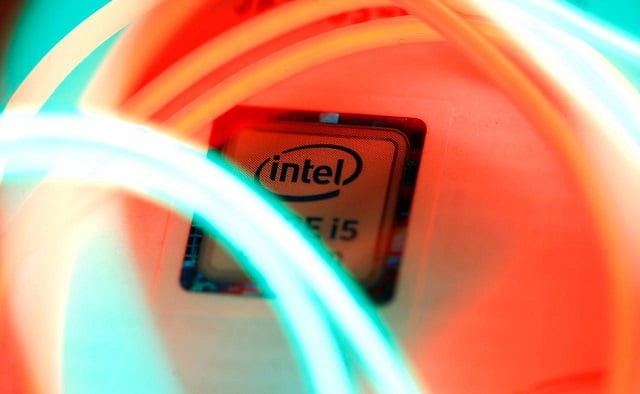Intel data center sales surge, warns of potential security flaw fallout
Those flaws dubbed Spectre and Meltdown created global concern among technology users and Intel acknowledged

Intel logo is seen behind LED lights in this illustration taken January 5, 2018.
PHOTO: REUTERS
Intel stock rose 3.8 per cent to $47.06, boosted by a 10 per cent dividend hike and the forecast, which signaled that Intel is succeeding in containing fallout from recently disclosed security flaws that could allow hackers to steal data from computers.
Those flaws, dubbed Spectre and Meltdown, created global concern among technology users, and Intel acknowledged on Thursday, for the first time, that the fallout could hurt future results. But Intel executives consistently indicated that they did not expect that to happen.
Intel halts chip flaw fix due to problem with patches
Software fixes for the problems would be succeeded by solutions designed into Intel chips themselves later this year, Chief Executive Brian Krzanich said on a conference call.
In an interview ahead of Intel’s earnings call with investors, Chief Financial Officer Bob Swan said the company sees no “meaningful impact” on corporate earnings from the vulnerabilities.
“They had all these bullets flying at them with these chip flaws, but when I look at these numbers, it’s a blowout across all metrics,” said Daniel Morgan, a fund manager with Synovus Trust, which holds Intel shares. “That makes it a bulletproof quarter.”
Revenue from the company’s higher-margin data center business rose about 20 per cent to $5.58 billion, beating the average analyst estimate of $5.13 billion, according to Thomson Reuters. Investors had targeted 10 per cent growth, said Kevin Cassidy, an analyst at Stifel.
”Data center group is one of the key metrics we are watching. It’s certainly a positive to see that turn up,” said Peter Karazeris, an analyst Intel investor Thrivent Financial.
Revenue from Intel’s PC group hit $9 billion for the quarter, a 2 per cent decline from the year before, but ticked up 3 per cent for the year to $34 billion.
Intel also saw strong growth in two small non-PC businesses that it hopes to expand in the future. Its so-called internet of things business, which focuses on connecting street lights and industrial machines to the web, expanded 21 per cent to $879 million for the quarter. Programmable chips, which customers like Microsoft are experimenting with using in data centers, grew 35 per cent to $568 million for the quarter.
Intel predicted $65 billion in revenue for 2018, well above expectations of a $63.7 billion forecast. The company also said its tax rate would be 14 per cent for 2018 after changes in US tax law that it executives said created a “level playing field” for US manufacturers.
Intel warned in its earnings release that fallout from the discovery of Spectre and Meltdown could hurt future results, as well as customer relationships and the company’s reputation.
Cloud companies consider Intel rivals after security flaws found
Analysts have said the biggest risk to Intel might come from customers using the disruption caused by fixing the bug as an excuse to press for lower prices.
The company posted a loss of $687 million, or 15 cents per share, in the fourth quarter ended December 30, including a $5.4 billion charge related to recent changes in US tax law.
Excluding items, the chipmaker earned $1.08 per share for the fourth quarter, up 39 per cent from 79 cents a year earlier. Total revenue for the quarter rose 4.1 per cent to $17.1 billion, up from $16.4 billion a year earlier.
Those figures beat analysts’ expectations of a profit of 86 cents per share on a revenue of $16.34 billion, according to Thomson Reuters.


















COMMENTS
Comments are moderated and generally will be posted if they are on-topic and not abusive.
For more information, please see our Comments FAQ